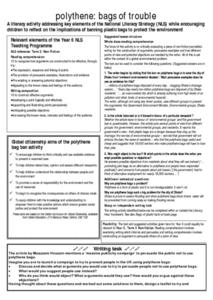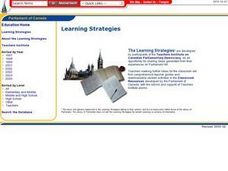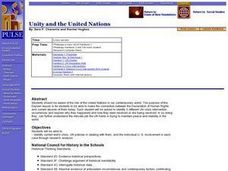Curated OER
Polythene: Bags Of Trouble
High schoolers investigate the use of polythene bags in the community and measure the possible impact upon the environment. They conduct research using a variety of resources. The information is used in order to create an evaluative...
Curated OER
Competing National Stories in Tibet
Students research the Tibetan conflict from the point of view of both Tibet and China. They review resources produced by both factions and then apply these skills to consider other competing national stories.
Curated OER
The Immigrant Experience in the United States
Students examine the experiences of an immigrant coming to the United States. Using the internet, they research information related to the Cuban/American baseball experience. They present their findings to the class and answer any...
Curated OER
Continuity and Change in Africa
Students become more informed about a country on the African Continent. They are more informed about the socio-political and socio-historical events within a selected country. This is done by performing research.
Curated OER
Analyzing the 2000 Election
Students research and analyze the year 2000 presidential election results. They identify the reasons this particular election was so unusual and predict how voting outcomes might affect their communities, the country and the world.
Curated OER
Maps of Indian Territory, the Dawes Act, and Will Rogers' Enrollment Case File
Students, in groups, analyze one map at a time, first the 1885 map, then the 1891 map. After they have completed the analysis sheets, they compare the two maps and answer questions imbedded in the plan.
Curated OER
Composing Communities in College
Learners conduct research about a local community of interest using observation, interviews and written sources. They follow the writing process and produce an essay on the topic.
Curated OER
Rebellion, Resolution, Empowerment; Embracing the Challenge to Make a Difference, Past and Present
Students study the social, economic, and political environment in Canada before 1837.
Curated OER
Girls Speak Out
Students discuss "education" and gender equity. They examine primary sources (video clips) of women/girls who do not have the privilege of an education. They create a pamphlet that will be used to publicize the issue of girls' education...
Curated OER
A Poster is Worth a Thousand Words
High schoolers list observations of PSA posters. They provide evidence/examples of their observations through class discussion. Students explore public health posters. They investigate historical public health campaign posters.
Curated OER
Unity and the United Nations
High schoolers identify current world crisis. They explore UN policies in dealing with them. Students access the individual U.S, involvement in each case through research analysis. They become aware of the role of the United Nations in...
Curated OER
Government Lesson Plan 11
Students apply United Nations' Universal Declaration of Human Rights (UDHR) and the United States Constitution to contemporary situations, and predict possible United Nations responses to violations of the UDHR.
Curated OER
Flower Power
Students view examples of Robert Harris' artwork to identify and describe the ecosystems in them. In groups, they work together to discuss how ecosystems breakdown and create solutions to keep this from happening. To end the lesson,...
Curated OER
Is Coming to the United States of America Good For the Immigrant?
Students evaluate impact of American politics, economy, culture, and environment on the immigrant, gather first person data, and use it to develop a persuasive presentation.















